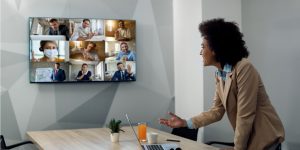
Thomas Thoen: Electrifying Online Instruction
It’s no surprise that Professor Thomas Thoen, electronics instructor at Pasadena City College (PCC), is popular with his students. He’s been an avid fan of electronic gaming since childhood, and most of his students identify as ‘gamers,’ too. Thoen shares his natural affinity with his students and works to make his classes as much fun as they are educational.

Finding a New Circuit
When the PCC campus closed down in March due to the COVID-19 pandemic, both Thoen and his students were non-plussed that the learning fun was screeching to a halt. In this case, that cessation of classroom and lab activities was particularly challenging because so much of the Electronics Technology that Thoen teaches requires hands-on learning. His students learn about the strategy and design around electronic circuitry, printed circuit hardware design, microcontrollers, digital electronics, and robotics, all of which require skillful manipulation of materials and tools. Without those hands-on training opportunities, they won’t gain the skills they need to enter today’s thriving electronics technology industries.
Thoen was equally dismayed about how to digitally replicate – if that was even possible – what he does at the school. His PCC lab is populated with special lab equipment, machines, tools, circuitry boards, etc., all the paraphernalia needed for the students to complete their labs. He was confident none of his students had those resources just lying around at home. However, after an almost 20-year teaching career (preceded by several years as an electrical engineer), he also knew he would be able to solve that problem, too.

An ‘AHA’ Moment – the Light Bulb Goes On!
While he had no problem moving his theory lectures online, he knew he had to provide his students the opportunity to practice the electronic skills those theories suggest. Fortunately, he had Strong Workforce Grant funds available, a stable home-based Internet connection, and a reliable car. He would purchase the parts his students need and meet them near campus, and in some cases deliver them to their homes, where they could practice what he was attempting to teach them. This possibility offered its own challenges:
Typical electronics equipment is expensive, and he needed to stretch his financial resources as far as he could. Shopping online, he found less costly but still eminently usable alternatives for each of his students.
He also needed licenses so his learners could access the designs and software they’d need to add to their home computers. The “Autodesk” online store came through with the solution to that problem. They directed him to comparable open-sourced software, which was free.
He also pursued a variety of reduced price options offered by companies actively helping students gain the resources needed to continue their education from a remote location.
Within a few weeks of going remote, Thoen had provided his students with both the equipment and the software they needed to implement at home what he would teach online.
Not that the situation was easy. The campus was closed, so Thoen only returned to it to retrieve needed supplies. Otherwise, he collected his wares in his home office/supply depot/family room, and the back of his car on delivery days. He also developed the video capabilities needed to record and upload his lessons to PCC’s online portal. Regardless of the difficulties, between Zoom meetings, video chats, and supply drop moments at each student’s home, he was able to retain almost 100% engagement with all of his learners right through to the end of the term.

Creating New Connections
According to Thoen, a big part of the success of his first COVID term was the excellent engagement by his students. Spanning the full scope of PCC’s student population, they included electronic tech wanna-be’s, yes, but also entrepreneurial types looking to build or improve on their big idea, budding electrical engineers, and just recreational folks looking to have some fun and learn some science. Almost all completed their labs and their term, and Thoen can’t be more proud of their accomplishment.
Looking ahead, Thoen is now more excited than he has ever been about his teaching future since he’s learned so much about how to optimize his already formidable skills for an online format. He has a clearer understanding of all the necessary bits and pieces that go into lab work, so he’ll have those ready and organized for his next class. His video’ing skills now capture the intricacies and nuances of electronic circuitry building and design, and he’s getting officially certified to teach via Distance Learning through an eight-week course provided by PCC. All in all, he’s much better prepared to meet student needs from a remote position.
However, as good as all that is, it is still not the icing on the top of Thoen’s cake when it comes to the COVID crisis. In his opinion, the best lesson both he and his students learned through the Spring 2020 PCC semester was how to be resilient. Regardless of the barriers and pivots and equipment swap-outs, he and they were able to meet the course goals as they were initially designed. Plus, everyone is now also skilled at online activities – how to attend virtual meetings, connect through the Internet, and follow through with strategies when they’re working at home, and there’s no one watching them.
All of these benefits will serve his students well, Thoen thinks, as they reach into their respective electronic technology futures. Those looking for careers now have more than just technical skills; they also have the work habits and collaborative abilities that will make them valuable employees somewhere, sometime, after the pandemic has passed.
As far as program updates, currently, Thoen is working with other faculty on updating the curriculum by developing new electronics courses based on the Internet of Things (IOT) and Audio Electronics. These courses will bridge the gaps between different disciplines and help students to understand the “bigger picture” of how electronics connect to different industries. Additionally, a stronger social media presence has been developed, including updating the PCC website, along with creating Facebook and Instagram pages. Please feel free to check these out!


